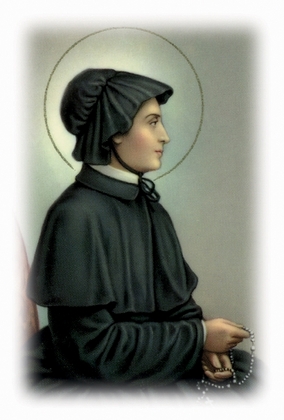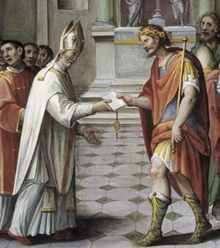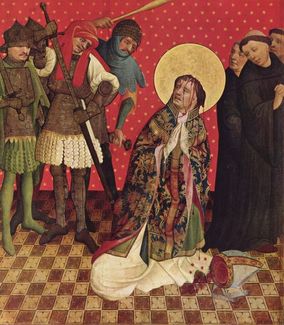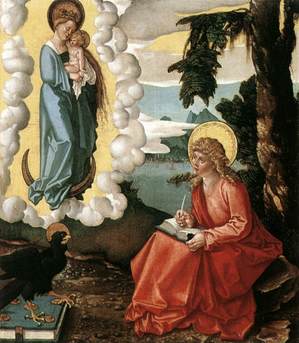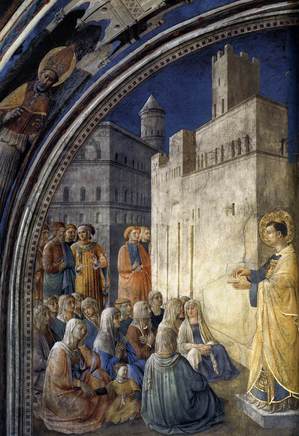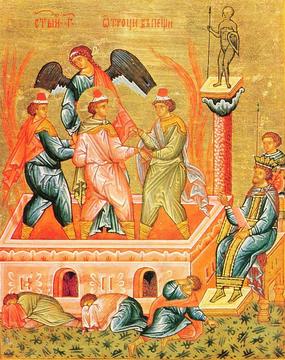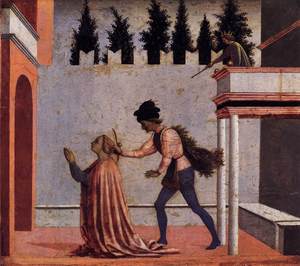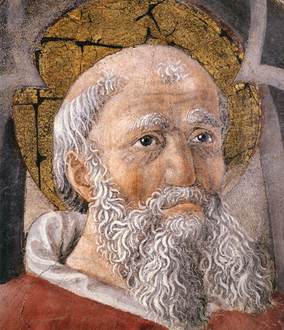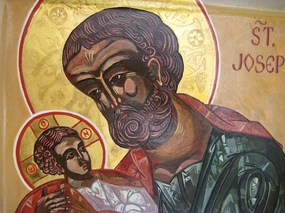 In the Season of Advent there are so many people to emulate: Jesus, Mary, the martyrs, various other saints, and Joseph in particular. Saint Joseph factors into Catholicism so much that one can reasonably ask, Can any good Catholic not pay attention to Saint Joseph? Obviously not. I took as my oblation name with the Benedictine oblates “Meinrad-Joseph” primarily because of the virtues of Saint Meinrad and for the devotion shown by Joseph for Jesus; in taking the name Meinrad-Joseph I honor my father, Edward Joseph.
In the Season of Advent there are so many people to emulate: Jesus, Mary, the martyrs, various other saints, and Joseph in particular. Saint Joseph factors into Catholicism so much that one can reasonably ask, Can any good Catholic not pay attention to Saint Joseph? Obviously not. I took as my oblation name with the Benedictine oblates “Meinrad-Joseph” primarily because of the virtues of Saint Meinrad and for the devotion shown by Joseph for Jesus; in taking the name Meinrad-Joseph I honor my father, Edward Joseph.
The Pope spoke on Sunday at the Angelus on the great foster father of Jesus and the patron saint against doubt, cabinetmakers, Canada, carpenters, China, confectioners, craftsmen, dying people, engineers, families, fathers, happy death, holy death, house hunters, Korea, laborers, Mexico, New France, people in doubt, Peru, pioneers, protector of the Church, social justice, travelers, Universal Church, Vatican II, Viet Nam, workers, working people. AND now the Pope adds pastors to this list under Saint Joseph’s care.
At Sunday’s Angelus Pope Benedict XVI had this to say about Saint Joseph:
On this fourth Sunday of Advent the Gospel of St. Matthew tells us how the birth of Jesus came about, taking the perspective of St. Joseph. He was the betrothed of Mary, who, “before they lived together, was found to be with child by the power of the Holy Spirit” (Matthew 1:18). The Son of God, realizing an ancient prophecy (cf. Isaiah 7:14), became man in the womb of a virgin, and such a mystery simultaneously manifests the love, wisdom and power of God on behalf of humanity wounded by sin. St. Joseph is presented as a “just man” (Matthew 1:19), faithful to God’s law, ready to do his will. On account of this he enters into the mystery of the Incarnation after an angel of the Lord appears to him in a dream and tells him: “Joseph, son of David, do not be afraid to take Mary your wife with you. In fact the child that has been conceived in her comes from the Holy Spirit; she will give birth to a son and you will call him Jesus: he in fact will save his people from their sins” (Matthew 1:20-21). Forgetting the thought of repudiating Mary in secret, he takes her in because his eyes now see the work of God in her.
St. Ambrose comments that “in Joseph there was amiability and the figure of a just man to make the quality of his witness more worthy” (Exp. Ev. sec. Lucam II, 5: CCL 14,32-33). “He,” Ambrose continues, “could not have contaminated the temple of the Holy Spirit, the Mother of the Lord, the fruitful womb of the mystery” (ibid. II, 6: CCL 14, 33). Although he had been concerned, Joseph “did as the angel of the Lord ordered him,” certain of doing the right thing. Also giving the name “Jesus” to that child who rules the entire universe, he enters into the ranks of the faithful and humble servants, like the angels and prophets, like the martyrs and the apostles — in the words of ancient eastern hymns. St. Joseph proclaims the wonders of the Lord, witnessing Mary’s virginity, the gratuitous deed of God, and caring for the earthly life of the Messiah. So, we venerate the legal father of Jesus (Code of Canon Law, 532), because the new man takes form in him, who looks to the future with confidence and courage, does not follow his own project, but entrusts himself totally to the infinite mercy of him who fulfills the prophecies and inaugurates the season of salvation.
Dear friends, to St. Joseph, universal patron of the Church, I would like to entrust all pastors, exhorting them to offer “to faithful Christians and the whole world the humble and daily proposal of the words of Christ” (Letter Proclaiming the Year for Priests). May our life be evermore conformed to the person of Jesus, precisely because “the one who is himself the Word takes on a body, he comes from God as a man and draws the whole of man’s being to himself, bearing it into the Word of God” (Jesus of Nazareth, San Francisco, 2008, 334). Let us invoke the Virgin Mary with confidence, the one who is full of grace, “adorned by God,” so that at Christmas, which is already near, our eyes may open and see Jesus, and the heart rejoice in this wondrous encounter of love.
